| Srl | Item |
| 1 |
ID:
180508


|
|
|
|
|
| Summary/Abstract |
Peter Magill considers the current state of bilateral defence procurement between the UK and France, analysing developments over the past 10 years and placing the current relationship within the context of Brexit. He argues that greater cooperation between the two countries is in the UK’s national interest and proposes several ways in which cooperation can be improved.
|
|
|
|
|
|
|
|
|
|
|
|
|
|
|
|
| 2 |
ID:
180505


|
|
|
|
|
| Summary/Abstract |
Integration is the latest focus for developing the UK armed forces, as well as other militaries facing similar challenges from adversaries blurring the boundaries between peace and war. Paul O’Neill argues, however, that it cannot be an end in itself. Integration needs to be relegated to and regulated by a higher purpose: adaptability.
|
|
|
|
|
|
|
|
|
|
|
|
|
|
|
|
| 3 |
ID:
180504


|
|
|
|
|
| Summary/Abstract |
Sieges, while not as flashy as hybrid warfare or grey-zone conflict, nor as trendy as disruptive technology and its associated concepts, command a central position in the wars of the post-Cold War era. Furthermore, despite being commonly associated with the tactical and operational level of conflict, sieges are often strategic and decisive affairs, as the siege of the US Embassy in Baghdad in December 2019 clearly demonstrated. Sieges bring a degree of decisiveness back to the battlefield, and those of the Russo-Ukrainian War (2014–present) bring this point to bear. In this article, Amos Fox suggests that policymakers, strategists and practitioners must understand how sieges operate and where they fit within war.
|
|
|
|
|
|
|
|
|
|
|
|
|
|
|
|
| 4 |
ID:
180506


|
|
|
|
|
| Summary/Abstract |
The coronavirus pandemic has had a significant impact on the nuclear industry, complicating operations and altering the delivery of both safety and security. This has generated concerns over the ability of governments and industry to provide vital services, while also protecting against changing threats that have evolved to take advantage of the pandemic. Christopher Hobbs, Nickolas Roth and Daniel Salisbury examine the nuclear security community’s response to this challenge, exploring how the risk landscape has been changed by the pandemic and the efficacy of new security solutions.
|
|
|
|
|
|
|
|
|
|
|
|
|
|
|
|
| 5 |
ID:
180507


|
|
|
|
|
| Summary/Abstract |
The coronavirus pandemic has highlighted some of the limitations of traditional assessments of the power of states as ‘strong’ or ‘weak’ in hard power terms. Diana Galeeva argues that when faced with a global human security threat, a state’s capacity can be partially measured by its ability to provide human security to its citizens, and to leverage its economic strength to provide foreign aid.
|
|
|
|
|
|
|
|
|
|
|
|
|
|
|
|
| 6 |
ID:
180503


|
|
|
|
|
| Summary/Abstract |
While the ‘fear, honour and interest’ trinity is immensely popular, it is also fallacious. Samuel Zilincik discusses how the trinity is not a neutral analytical tool but rather a rhetorical instrument to advocate foreign aggression. It conveys an incomplete picture of war causation by focusing on the aggressor’s motivation while ignoring that of the defender. It also insufficiently explains motivations for hostile behaviour by omitting salient stimuli and the variance of emotional motives across cultures. Through its popularity, the trinity also detracts attention from truly insightful observations that Thucydides made in his work. Zilincik suggests that going beyond the trinity is essential to enhancing knowledge of strategic affairs.
|
|
|
|
|
|
|
|
|
|
|
|
|
|
|
|